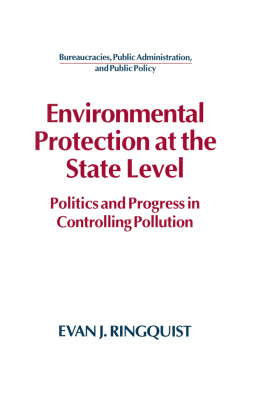Environmental Science and International Politics
REACTING CONSORTIUM PRESS
This book is a reacting game. Reacting games are interactive role-playing games in which you, the student, are responsible for your own learning. They are used at more than 300 colleges and universities in the United States and abroad. Reacting Consortium Press is a publishing program of the Reacting Consortium, the association of schools that use reacting games. For more information visit http://reactingconsortiumpress.org.
Environmental Science and International Politics
ACID RAIN IN EUROPE,19791989, AND CLIMATE CHANGE IN COPENHAGEN,ECEMBER2009
DAVID E. HENDERSON AND SUSAN K. HENDERSON

2018 David E. Henderson and Susan K. Henderson
All rights reserved
Set in Utopia and The Sans
by Westchester Publishing Services
Manufactured in the United States of America
The University of North Carolina Press has been a
member of the Green Press Initiative since 2003.
ISBN 978-1-4696-4029-7 (pbk.: alk. paper)
ISBN 978-1-4696-4030-3 (ebook)
Cover illustration: Photo of the Earth seen from Apollo 17 (NASA/Apollo 17 crew; taken by either Harrison Schmitt or Ron Evans).
Distributed by the
University of North Carolina Press
116 South Boundary Street
Chapel Hill, NC 27514-3808
1-800-848-6224
www.uncpress.org
Contents
Environmental Science and International Politics
NOTE TO INSTRUCTORS
This text contains two reacting games that deal with the intersection of environmental science and public policy. The Acid Rain game may be played in its entirety, or specific parts can be used as separate shorter games. The Climate Change game is a separate game from the Acid Rain game. The scientific issues are different in the various games, but the policy issues are very similar. Instructors should identify exactly what sections of the text are to be used.
How to Play These Games
These two games are reacting games. Reacting games use complex role-playing games to teach about important moments in history. After a few preparatory lectures, the game begins, and the students are in charge; the instructor serves as adviser. The games are set in moments of heightened historical tension, and they place you, the student, in the role of a person from the period. By reading the game book and your individual role sheet, you discover objectives, potential allies, and the forces that stand between you and victory. You must then attempt to achieve victory through formal speeches, informal debate, negotiations, and conspiracy. The outcomes will sometimes differ from actual history; a postmortem session sets the record straight.
What follows is an outline of what you will encounter in reacting games and what you will be expected to do.
GAME SETUP
Your instructor will spend some time before the beginning of the game helping you to understand the historical context for the game. During the setup period, you will use several different kinds of material:
- The game book (from which you are reading now), which includes historical information, the rules and elements of the game, and essential documents.
- A role sheet (provided by your instructor), which has a short biography of the historical person you will model in the game as well as that persons ideology, objectives, responsibilities, and resources.
In addition to the game book, you may also be required to read historical documents or books written by historians. These provide additional information and arguments for use during the game.
Read all this contextual material and all these documents and sources before the game begins (or as much as possibleyou can catch up once the game is under way). And, just as important, go back and reread these materials throughout the game. A second and third reading while you are in the role will deepen your understanding and alter your perspective, for ideas take on a different aspect when seen through the eyes of a partisan actor. Students who have carefully read the materials and know the rules of the game will invariably do better than those who rely on general impressions and uncertain memories.
GAME PLAY
Once the game begins, class sessions are presided over by students. In most cases, a single student serves as some sort of presiding officer. The instructor then becomes the Gamemaster (GM) and takes a seat in the back of the room. Though they do not lead the class sessions, GMs may do any of the following:
- Pass notes.
- Announce important events (e.g., Sparta is invading!). Some of these events are the result of student actions; others are instigated by the GM.
- Redirect proceedings that have gone off track.
- Call for a recess if debates become overheated.
The student presiding officer is expected to observe basic standards of fairness, but as a fail-safe device, most reacting games employ the Podium Rule, which allows a student who has not been recognized to approach the podium and wait for a chance to speak. Once at the podium, the student has the floor and must be heard.
Role sheets contain private, secret information, which students are expected to guard. You are advised, therefore, to exercise caution when discussing your role with others. Your role sheet probably identifies likely allies, but even they may not always be trustworthy. However, keeping your own counsel or saying nothing to anyone is not an optionto achieve your objectives, you must speak with others. You will never muster the voting strength to prevail without allies. Collaboration and coalition building are at the heart of every game.
These discussions must lead to action, which often means proposing, debating, and passing legislation. Someone thus must be responsible for introducing the measure and explaining its particulars. And always remember that a reacting game is only a gameresistance, attack, and betrayal are not to be taken personally because game opponents are merely acting as their roles direct.
Some games feature strong alliances called factions. These games may seem frustrating because many factions are tight-knit groups with fixed objectives. This may make finding a persuadable ally seem impossible, but fortunately these games include roles called Indeterminates, who operate outside the established factions. Not all Indeterminates are entirely neutral; some are biased on certain issues. If you are in a faction, cultivating Indeterminates is in your interest because they can be convinced to support your position. If you are lucky enough to have drawn the role of an Indeterminate, you should be pleasedyou will likely play a pivotal role in the outcome of the game.
Game Requirements
Students in reacting games practice persuasive writing, public speaking, critical thinking, teamwork, negotiation, problem solving, collaboration, adapting to changing circumstances, and working under pressure to meet deadlines. Your instructor will explain the specific requirements for your class. In general, though, a reacting game asks you to perform three distinct activities: reading and writing, public speaking and debate, and strategizing.
Reading and Writing
The standard academic work of reading and writing is carried on more purposefully in a reacting course. What you read is put to immediate use, and what you write is meant to persuade others to act the way you want them to. The reading load may have slight variations from role to role, and the writing requirement will depend on your particular course. Papers are often policy statements, but they can also be autobiographies, battle plans, spy reports, newspapers, poems, or after-game reflections. In most cases papers are posted on the class website in advance of each game session for examination by others. Papers provide the foundation for the speeches delivered in class.
Next page








